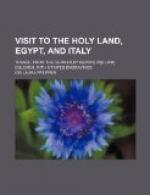We disembarked immediately beyond the “Seven Towers,” and walked for half an hour through long empty streets, then out at the town-gate, where the cypress-grove for a time conceals from our view a large open space on which is built a pretty Greek church. I was told that during the holidays at Easter such riotous scenes were here enacted that broken heads were far from being phenomena of rare occurrence. In the church there is a cold spring containing little fishes. A legend goes, that on the high days at Easter these poor little creatures swim about half fried and yet alive, because once upon a time, when Constantinople was besieged, a general said that it was no more likely that the city could be taken than that fishes could swim about half fried. Ever since that period the wonderful miracle of the fried fish is said to occur annually at Easter.
On our return to our kaik, we saw near the shore an enormous cuttle-fish, more than fourteen feet in length, which had just been taken and killed. A number of fishermen were trying with ropes and poles to drag the monster ashore.
The walks in the immediate neighbourhood of Pera are the great and little Campo, and somewhat farther distant the great bridge which unites Topana with Constantinople; the latter is a most amusing walk, during which we can view the life and bustle on both shores at the same time. In the little Campo are two Frankish coffee-houses, before which we sit quite in European fashion on handsome chairs and benches, listening to pleasant music, and regaling ourselves with ices.
Feasts in Constantinople.
During my residence in Constantinople I had the good fortune to be present at some very entertaining festivities. The most magnificent of these took place on the 23d of April, the anniversary of Mahomet’s death.
On the eve of this feast we enjoyed a fairy-like spectacle. The tops of all the minarets were illuminated with hundreds of little lamps; and as there are a great many of these slender spires, it can be readily imagined that this sea of light must have a beautiful effect. The Turkish ships in the harbour presented a similar appearance. At every loop-hole a large lamp occupied the place of the muzzle of the cannon. At nine o’clock in the evening, salvoes were fired from the ships; and at the moment that the cannons were fired, the lamps vanished, flashes of light and gunpowder-smoke filled the air; a few seconds afterwards, as if by magic, the lamps had reappeared. This salute was repeated three times.




